- Home
- slideshows
- miscellaneous
- This Chinese super-app is Apple's biggest threat in China and could be a blueprint for Facebook's future. Here's what it's like to use WeChat, which helps a billion users order food and hail rides.
This Chinese super-app is Apple's biggest threat in China and could be a blueprint for Facebook's future. Here's what it's like to use WeChat, which helps a billion users order food and hail rides.
When you first open up WeChat, it looks a lot like WhatsApp. Beneath the surface, though, the "Discover" button opens up a Facebook-style newsfeed, while "Mini Programs" is your gateway to specialized apps that let you order food or hail a ride.

The key to WeChat's success is its QR code scanner, which has allowed it to become the dominant payments app in China.

You may have used QR codes before — like to add a friend in Snapchat via their Snap code, or using your phone's camera to open up a link from a poster or flyer.
But in China, WeChat's scan function goes far beyond that.
For instance, you can use WeChat Pay to ride the subway in parts of urban China. Just snap a picture of the QR code at the fare gate to pay your way.
WeChat QR codes are pushing China into becoming a cashless society. Even its street vendors use WeChat Pay to sell vegetables.
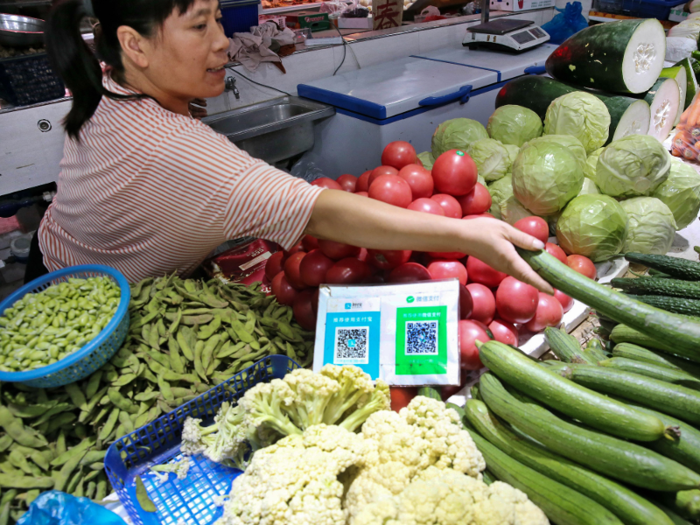
QR codes, by way of WeChat's mobile payment system, are pushing China towards becoming a cashless society. To pay for clothes at a store, just take a picture of the QR code at the register. Ditto for paying for fast food, and even at more upscale joints, waiters and bartenders might even have WeChat QR codes to accept tips.
And street vendors selling meat and vegetables also have a QR code set up for customers on a morning grocery run.
WeChat's QR codes are literally everywhere, going beyond payments — some public bathrooms in China even need you to scan one just to use toilet paper.
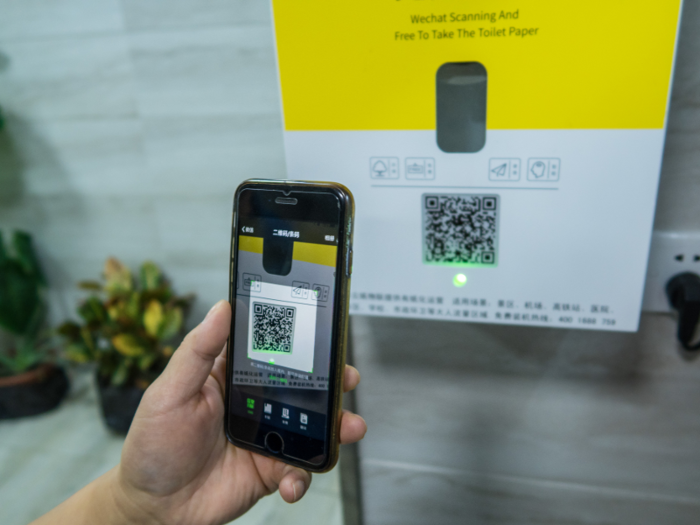
Scanning WeChat QR codes has woven its way into social etiquette, as scanning a client's personal QR code has replaced the need for exchanging business cards.
Some public services depend on WeChat QR code, too. For instance, the South China Morning Post reported last year that China equipped its public restrooms with smart toilet paper dispensers to reduce toilet paper theft and waste, so you need to either scan a QR code or use the system's facial recognition to use the dispensers.
WeChat's "Mini Programs" are a dream for users, but might be Apple's biggest nightmare in China.
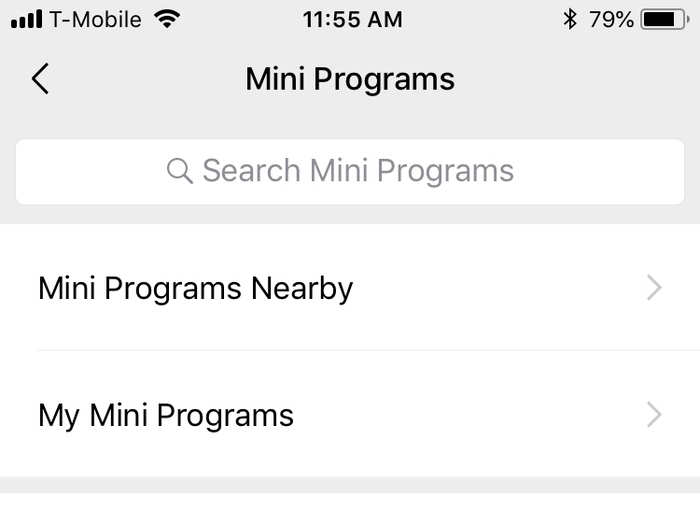
WeChat's "Mini Programs" save you from downloading apps onto your phone.
They offer access to a dizzying variety of services, straight from WeChat: Didi Chuxing, China's ride-hailing service, lets you hail and pay for rides without leaving WeChat. Individual restaurants might have their own mini programs, accessed via a QR code on the table,
Restaurant tables often also have Mini Programs, which users can access via a QR code on the restaurant table, and proceed to order food, pay, and have it served to the table, without human intervention.
One perhaps-unintended casualty of this approach is customer loyalty for the iPhone. Because WeChat is available on both iOS and Android, Chinese iPhone users feel less averse to switching away from the Apple family of products, the Wall Street Journal reported in 2017.
WeChat's more social features include a Facebook-like 'moments' stream, where you share pictures, articles and personal updates.
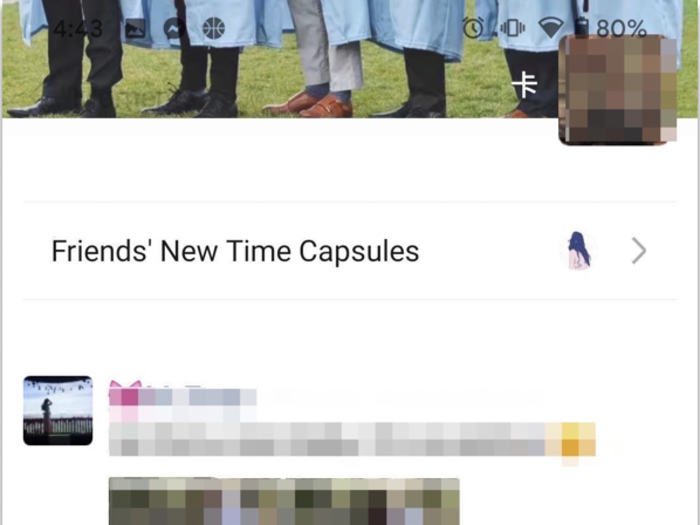
A 'moments' stream lets your contacts share their pictures and updates, much like Facebook's newsfeed.
There's also a 'search' stream that looks a lot like Twitter, where you can find articles, official accounts, and trending topics.
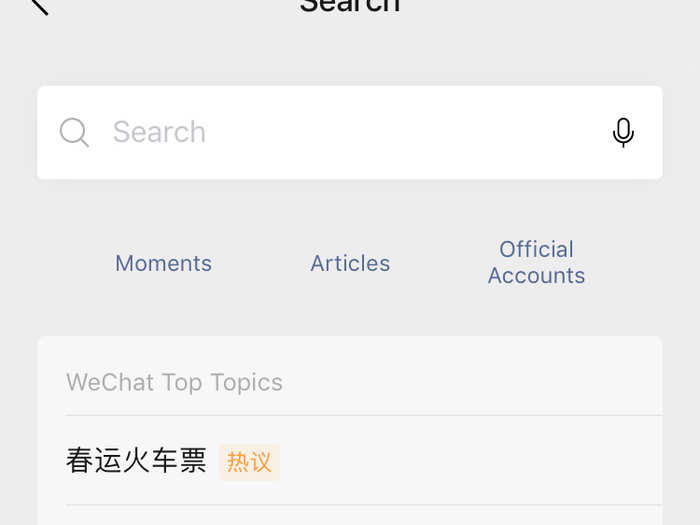
You can also find whimsical stickers like 'fatty deities' or 'silly piggy' on chat, which don't seem to serve a practical purpose, but they have boosted local artists to fame.
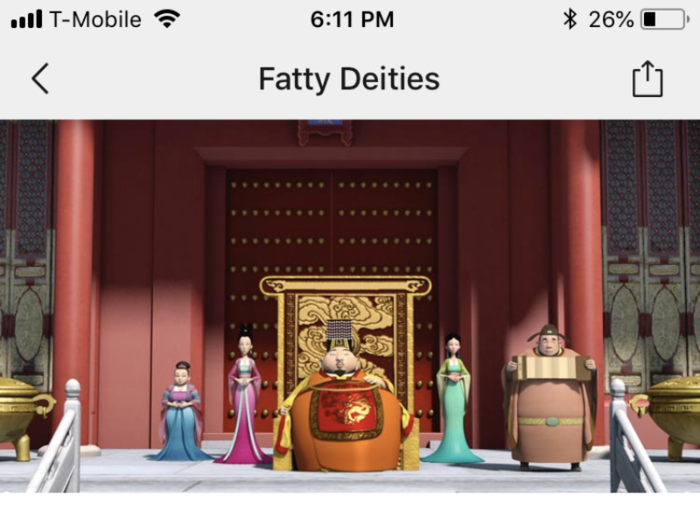
Like Facebook or Apple's iMessage, WeChat offers stickers — cute graphics that can spice up your text conversations.
While WeChat has an official sticker library, users love the customizable sticker collections that anybody can upload for public consumption. Those stickers can turn the artist into a celebrity: Fans can even donate via WeChat Pay to the creators of their favorite stickers.
Those artists can watch their fame (and wealth) skyrocket, such as in the case of the Silly Piggy sticker collection allowing its creator River Rui to leave her day job to set up shop as an independent artist, reported by AFP.
It's worth noting that these stickers are still subject to strict censorship laws. Stickers of Winnie the Pooh were removed from WeChat's official sticker gallery after a series of memes compared the cartoon bear to President Xi Jinping, according to AFP.
WeChat is home to all kinds of communities, including buy-and-sell groups where payments are handled via WeChat Pay. There are even WeChat influencers, who hawk products for sale via the app.
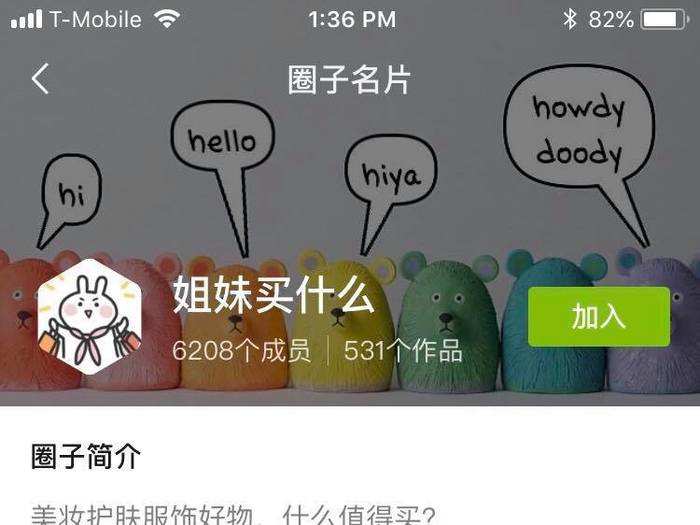
You can also find Yelp-like neighborhood reviews and recommendations, with listings well outside China — this is what it looks like when we tried it in the San Francisco Bay Area.
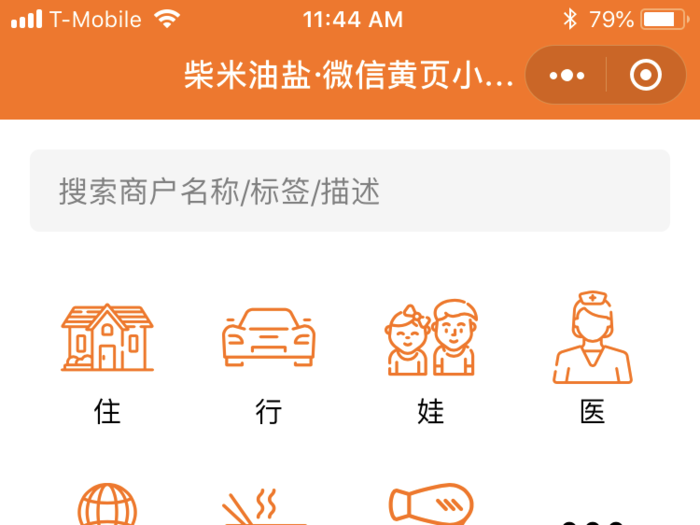
Notably missing from the app: Advertisements.

WeChat has surprisingly few advertisements compared to its peers in the industry. WeChat users only see one to two ads per day through the Moments feature, Tencent's chief strategy officer James Michelle told the business magazine Campaign earlier this year.
This largely seems due to WeChat founder and president Allen Zhang's views on the app's aesthetics. Zhang has stressed simplicity in the app's design, ensuring that it remains aesthetically pleasing to its users.
During a four hour-long speech transcribed and published by WeChat itself this January, Zhang stressed his distaste for products created to drive traffic.
"I noticed that in various industries, when a product manager graduates and starts working, the company will misguide them. Because the company's objective is to increase traffic and make money, hence everyone's KPI is also to increase traffic and make money. This means the product manager's work objective is not to create the best product, but to use whatever means necessary to obtain traffic."
"We don't support this way. What we advocate more is to use WeChat to create good products for our users," Zhang said.
The app's success is increasingly global: Some American institutions have started to cater to WeChat users with their own Mini Programs.
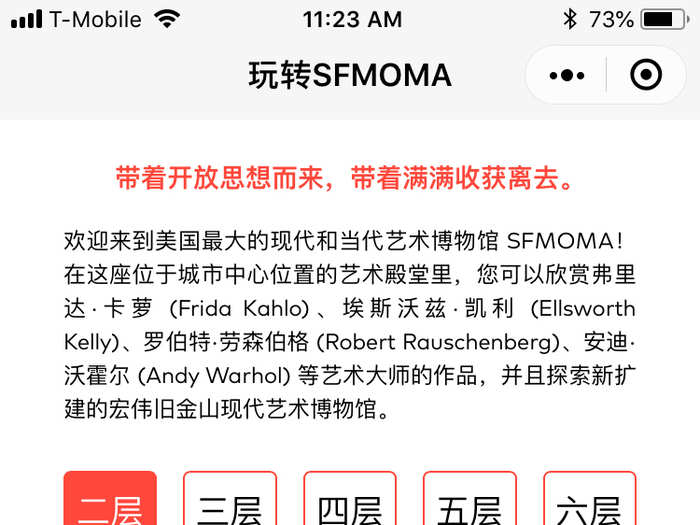
The San Francisco Museum of Modern Art (MoMA) has a mini program for WeChat users, offering a room-by-room guide and an audio companion to the museum's exhibitions for Mandarin-speaking tourists. There's a similar app available for iOS and Android, but the WeChat mini program requires no separate download, saving time and energy.
But using WeChat in the US is difficult, as WeChat Pay is not available in the US and language can be a barrier.
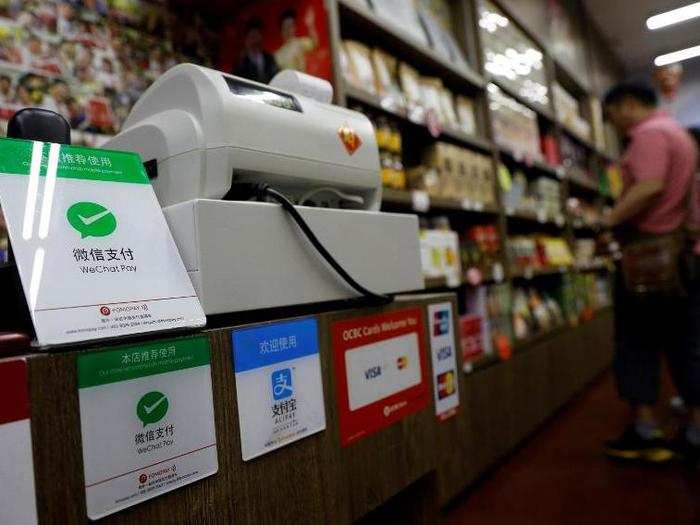
WeChat users outside China have a much more limited use of the app. Although WeChat Pay is available to Chinese tourists travelling in the US — and foreign tourists travelling in China — American WeChat users still can't use it.
The results are far-reaching: for instance, many Mini Programs require access to WeChat Pay, so these services are only available in China.
Another limitation is not knowing Mandarin, exploring the full potential of the app, even if you're in China, can be difficult.
Although you can navigate through the chat stream, search for English mini programs, and join English groups, most of the app's users communicate in Mandarin. Most of the app's services are catered to its Chinese userbase. So to join groups or take advantage of certain Mini Programs, knowing the language seems to be a necessity.
And to address the elephant in the room, it isn't clear to what degree Chinese censorship laws are applied to WeChat users in the US.

Tencent technically operates two different versions of WeChat: the China-based Weixin (微信) and its international counterpart, WeChat. (This is similar to how ByteDance handles its viral video app TikTok, which operates as Douyin in China).
Tencent says that the difference between WeChat and Weixin goes beyond the name. The two are "sister apps" offering "different content and features," a company statement to Business Insider said.
Tencent says these two versions exist to allow the company to navigate different regulatory environments. While WeChat and Weixin users can talk to each other, Tencent says it applies Chinese data-surveillance laws to monitor Weixin users, and may block content, but it does not do so for WeChat users.
However, The Verge reported that an American information security analyst named Bin Xie had his WeChat account taken down after writing "the pro-China candidates totally lost," referring to Hong Kong's recent election, in a group.
On a lighter note, I wanted to highlight "Shake," a quirky WeChat feature which helps you find new friends by matching you with somebody, anywhere in the world, who is shaking their phone at the exact same time that you are.
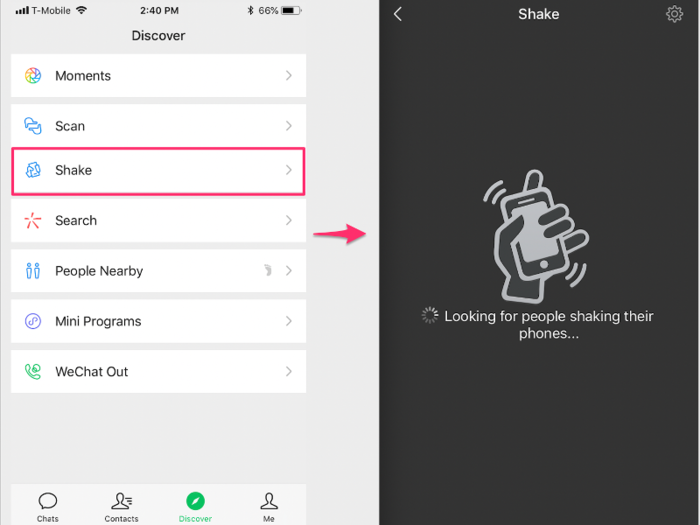
Got a tip about Tencent or WeChat? Contact this reporter via email at bsapra@businessinsider.com, Telegram and WeChat at bani_sapra, or Twitter DM at @bani_sapra to find out how to contact me via encrypted messaging app Signal.
Popular Right Now
Advertisement